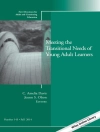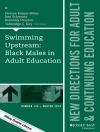This book analyses and elaborates on learning processes within work environments and explores professional learning. It presents research indicating general characteristics of the work environment that support learning, as well as barriers to workplace learning. Themes of professional development, lifelong learning and business organisation emerge through the chapters and contributions explore theoretical and empirical analyses on the boundary between working and learning in various contexts and with various methodological approaches.
Readers will discover how current workplace learning approaches can emphasise the learning potential of the work environment and how workplaces can combine the application of competence that is working, with its acquisition or learning. Through these chapters, we learn about the educational challenge to design workplaces as environments of rich learning potential without neglecting business demands.
Expert authors explore how learning and working are both to be considered as two common aspects of an individual’s activity. Complexity, significance, integrity and variety of assigned work tasks as well as scope of action, interaction and feedback within its processing, turn out to be crucial work characteristics, amongst others revealed in these chapters.
Part of the Professional and Practice-based Learning series, this book will appeal to anyone with an interest in workplaces as learning environments: those within government, community or business agencies and within the research communities in education, psychology, sociology and business management will find it of great interest.
สารบัญ
Discourses on professional learning: on the boundary between learning and working, Christian Harteis, Andreas Rausch, Jürgen Seifried.- Part I: Analytic perspective 1 – Learning in work context.- Informal learning in workplaces – understanding learning culture as a challenge for organizational development, Christoph Fischer, Bridget O’Connor.- Agentic behaviour at work: Crafting learning experiences, Michael Goller, Stephen Billett.- Practiced professional agency and collaborative creativity, Panu Forsman, Kaija Collin, Anneli Eteläpelto.- Mediating occupational learning at work, Stephen Billett.- Error Climate and the Individual Dealing with Errors in the Workplace, Alexander Baumgartner, Jürgen Seifried.- Reflection and reflective behaviour in work teams, Thomas Schley, Marianne van Woerkom.- Part II: Analytic perspective 2 – Work as learning environment.- Apprenticeship and Vocational Education, Karl-Heinz Gerholz, Taiga Brahm.- Learning in response to workplace change, Mark Tyler, Sarojni Choy, Ray Smith, Darryl Dymock.- Grasping learning during internships: The case of engineering education, David Gijbels, Christian Harteis, Vinvent Donche, Piet van den Bossche, Steffi Maes, Katrin Temmen.- Employing agency in academic settings: Doctoral students shaping their own experiences, Michael Goller, Christian Harteis.- Developing medical capacities and dispositions through practice-based experiences, Jennifer Cleland, Joseph Leaman, Stephen Billett.- e Portfolio: A Practical Tool for Self-directed, Reflective and Collaborative Professional Learning, Anna-Liza Daunert, Linda Price.- Part III: Methodological issues.- The integration of work and learning: Tackling the complexity with Structural Equation Modelling, Eva Kyndt, Patrick Onghena.- Social network analyses of learning at workplaces, Tuire Palonen, Kai Hakkarainen.- Learning through interactional participatory configurations: contributions from video analysis, Laurent Filliettaz.- Using Diariesin Research on Work and Learning, Andreas Rausch.- Part IV: Conclusion.- Interdependence on the boundaries between working and learning, Stephen Billett.












